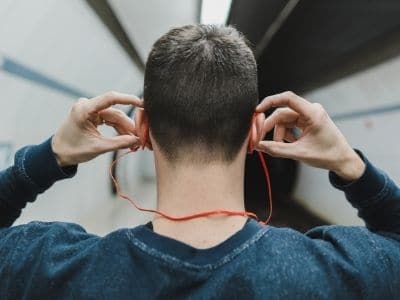

Most of us have a natural sense of the power of sound and sound healing. Perhaps you know a song that always cheers you up, or you've found it impossible to concentrate when hearing the noise of a certain frequency.
What's less well known is that sound can actively heal and help you. But where should you start if you want to learn how to use sound therapy in your own life?
In this article, we'll first help you get a grip on what sound healing actually involves before we consider three distinct types of sound healing therapy.
From there, we'll look at five of the most powerful instruments you can use for sound therapy – some of which you may already have in your possession.
Finally, we'll look at exciting new ideas about the interplay between sound healing and hypnosis – both of which can harness your subconscious to help you build a happier, more successful life.

So, what exactly is sound healing? Sometimes called music therapy, this alternative approach to well-being encompasses any practice during which music is used to boost any aspect of health.
This can involve improvising along to music, singing, simply listening, chanting, or reciting rhythmic prayers against a background of music. In some cases, sound healing practitioners even design specific soundtracks intended to influence brainwaves to boost positivity or focus.
Depending on the form of sound therapy used, sound healing benefits include impacts on social development, emotional trauma, cognitive function, and mood.
For example, one study in a top nursing journal in 2006 found that people experience less pain and anxiety after music therapy, while there is increasingly promising research into ways in which music therapy might address post-traumatic stress disorder, reduce insomnia, and even enhance immune function.
But why does this healing practice have such potent effects? To understand this, we need to consider the power of frequencies and vibrations.

A key aspect of music therapy is sound healing frequencies.
We're not healed by just any music or sound, after all – all healing frequencies on any practitioner's healing frequencies list have a particular resonance that floods our brain with feel-good hormones like dopamine and oxytocin.
In addition, those who work with the Law of Attraction highlight that we all constantly vibrate on particular frequencies that influence what we manifest in our own lives.
In other words, the people and events we draw toward us.
With music therapy, our vibrational frequency can be heightened, improving our inner lives and the positivity we radiate.
With the groundwork on the basics of sound therapy now laid, let's now turn to some examples of the most effective sound healing methods.
Then, we'll think about which instruments (including your own voice) can be used to practice these techniques at home or with an expert practitioner.

Sound healing meditation combines the impact of music with that of mindfulness or meditation.
Crucially, instead of meditating in a silent space, you meditate to a particular sound.
This could be a song of your choosing, a specially designed track to tune your brain waves to a particular frequency, or even sounds from nature that connect you with feelings of calmness and peace.
In time, sound healing meditation can train you to respond with the desired feeling without even having to meditate.
For example, if you're an anxious speaker about to give a presentation, you can simply turn on the sound and immediately feel centered and positive.

Neurological music therapy focuses on a batch of training techniques that aim to enhance cognitive function.
These techniques were developed through rigorous research and testing and with a comprehensive knowledge of how music and sound impact the brain's speech, language, and processing centers.
While anyone can in principle benefit from neurological music therapy, it's thought to be especially useful for those whose cognitive function has been damaged in some way, such as those who have suffered from strokes, traumatic brain injuries, and degenerative neurological diseases.
It is proven to speed up rehabilitation, helping to improve cognitive functioning and support maximal independence.
Thirdly, binaural beats frequency tracks involve hearing two different tones (one in each ear).
Depending on the speed and frequency of the tones, they can help you get into a different state of mind.
Sometimes advertised as “brainwave entrainment”, binaural beats can be at one of five frequencies, doing everything from supporting dreamless sleep (the delta frequency pattern) to enhancing creativity (the theta pattern) or keeping you alert for long periods (the gamma pattern).
If this sounds good to you, click here to learn more and discover how you can benefit from binaural beats in your own life.
You now have a sense of the broad scope of sound therapy, but you might be wondering what instruments work for music therapy.
Happily, it's easy to get hold of sound therapy recordings.
However, if you're just curious about the process or even wonder whether you might want to do so at home, here are five healing instruments.

If you haven't heard of a singing bowl, the two most common types are the Himalayan singing bowl and the crystal singing bowl.
The former are metal bowls made of forged alloys, which you can hammer by hand or with a striking rod.
They make a warm, rhythmic, and gentle sound that can help with focus and induce a sense of calm with peace of mind.
Most frequently, they're used to help people enter and sustain a meditative state.
However, some practitioners also believe that different singing bowl tones can heal different chakras – powerful energy centers throughout the body.
Tuning fork therapy uses calibrated metal forks to produce a range of tones that are meant to influence different areas of your body.
They are often used to help with mood swings, and they are said to induce emotional balance.
In addition, sound therapy tuning forks are good for releasing mental and emotional tension.
They are inexpensive and can be handy tools to learn to use at home for busting stress.

An ancient instrument from Bronze Age China, the gong has undeniable healing power.
Indeed, here at GreaterMinds, our logo is within a gong – a symbol of mental, emotional, and physical balance.
Gong bath sessions famously make people feel as though they have had a wonderful night's sleep.
The sound resonates all throughout the body in waves, and this can help with everything from chronic pain to work stress, restlessness, and generalized anxiety.
As opposed to the steel drums and loud drum kits you'd normally encounter, sound healing drums (sometimes called Indian drums) produce a light, calming sound.
These relaxing drums can put you into a meditative state so deep that it is similar to a hypnotic trance, during which your subconscious mind becomes open to healing suggestions.
Research shows that when you're in this trance state, any physical pain dulls and your brain goes into a resilience-boosting rest state.
Finally, think back to the wonderful experience of a loved one singing a lullaby to you when you were a child.
This showcases the calming abilities of the human voice, which never loses its power.
You don't need to be a trained singer to do voice healing therapy – anyone can learn to hum at the right pitch to unwind, or to energize your mind.
These techniques are particularly good at refocusing you when you get distracted.
Sound healing therapy is undeniably powerful. It's a versatile, easily learned approach to fine-tuning your mind and body, helping you feel the way you want to feel.
However, it's not the only way to influence your brainwaves and inner vibrational frequency, and it can be complemented by other methods.
One of the most powerful is self-hypnosis – a way of accessing and transforming your conscious mind through suggestion.
During hypnosis, you become deeply relaxed, and you can then be led through a process of abandoning old beliefs and feelings that no longer serve you.
No matter what you want to change, whether it's work performance or self-confidence, self-hypnosis can align your frequency with your dream future.
To that end, our Positive Attitude self-hypnosis program aims to get you into the best mental state of your life, supporting you in seeing the best in every opportunity as well as in yourself.
